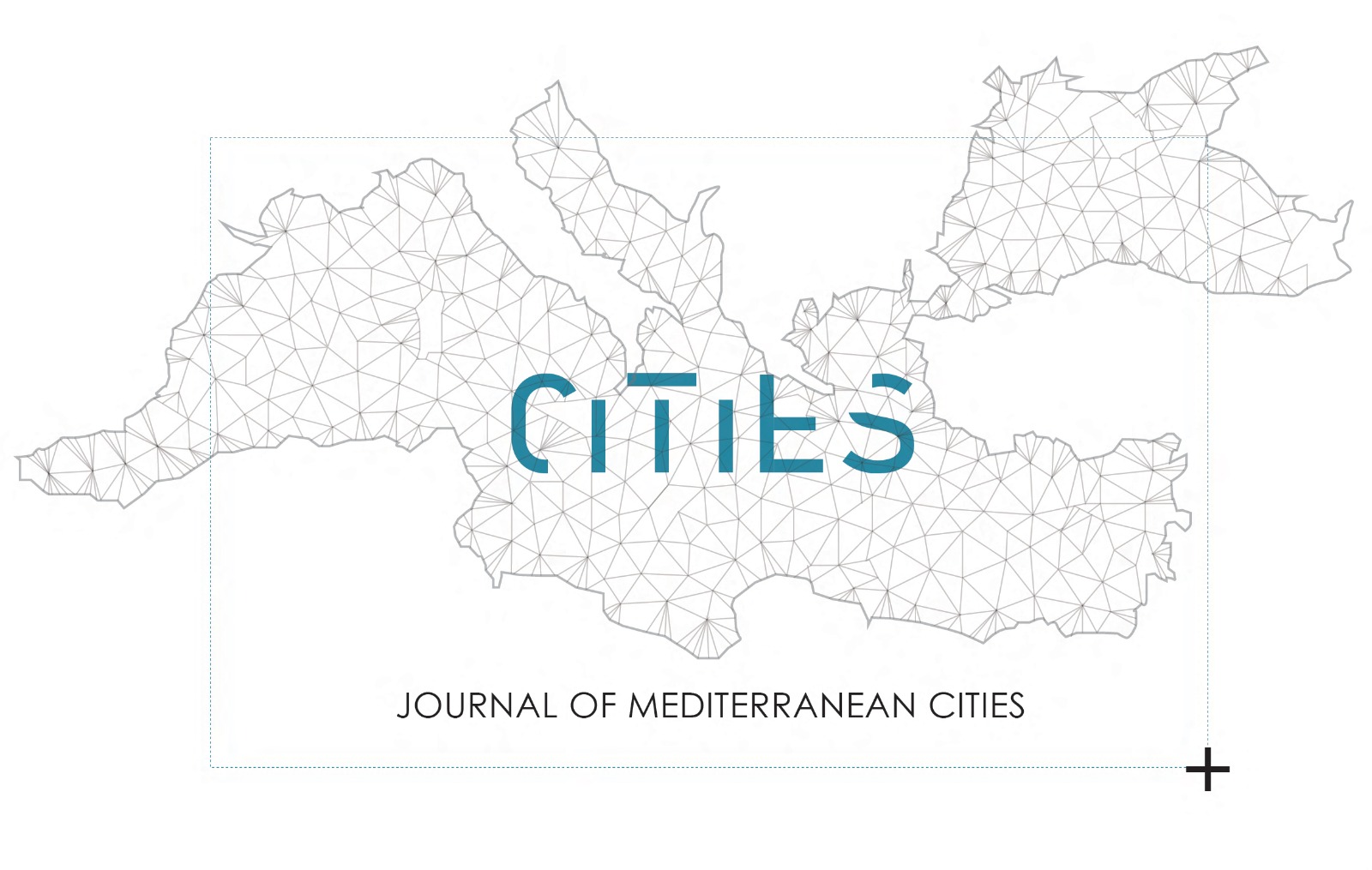Hermeneutic Cartography for the Restitution of a Lost Antique Seaport
Case of Muslubium Horrea of Bejaia, Algeria
DOI:
https://doi.org/10.38027/mediterranean-cities_vol4no1_11Keywords:
Antique Seaport Settlement, Muslubium Horrea, Cartographic Restitution, Cartographic Hermeneutics, PhotogrammetryAbstract
This article deals with the reconstruction of an ancient seaport in the town of Bejaia, known as Muslubium Horrea. This settlement, ignored by the official historiography, would nevertheless have played an important role in wheat exports and trade with the Roman port of Ostia. Moreover, of all the ancient ports known to date, the Algerian coast has only two port warehouses, and Muslubium Horrea is the only granary belonging to the Roman province of Mauretania Sitifensis (400AD). The methodology adopted to locate and reconstruct the topography and the settlement’s structures is based on the concept of cartographic hermeneutics. The compilation of existing historical accounts and the interpretation derived from the superimposition of ancient geographical maps and 19th century archaeological and geological maps identified all the natural resources necessary for its construction, in particular the abundance of water sources and deposits of geomaterials for construction (clay, stone, gypse, marble, etc.). These data were confirmed by field and photogrammetric surveys, resulting in a map showing the archaeological context of the Muslubium Horrea port and the remains of structures still visible today. The approach adopted allowed to delineate the size of the port site and scale the structures that make it up, as well as identify the water supply source and its primitive topography prior to its establishment.
Downloads
References
Adam, J. P. (1995). La construction romaine, matériaux et techniques (3rd ed.). Grands manuels Picard. ISBN 2708410377.
Adolphe, J. et al. (1869). Dictionnaire géographique, administratif, postal, statistique, archéologique, etc., de la France, de l'Algérie et des colonies... [Volume 2 can be consulted online at the Gallica website: http://catalogue.bnf.fr/ark:/12148/cb3]
Al-Ruzouq, R. (2012). Photogrammetry for archaeological documentation and cultural heritage conservation. In D. Carneiro da Silva (Ed.), Special applications of photogrammetry. InTech. https://doi.org/10.5772/35442. ISBN 978-953-51-0548-0. DOI: https://doi.org/10.5772/35314
Ambert, P. (2000). Narbonne antique et ses ports, géomorphologie et archéologie, certitudes et hypothèses. Revue archéologique de Narbonnaise, 33, 295–307. https://doi.org/10.3406/ran.2000.1569. DOI: https://doi.org/10.3406/ran.2000.1569
Arnaud, P. (2005). Les routes de la navigation antique. Errance. ISBN 978-2-87772-647-4.
Arnaud, P. (2016). Les infrastructures portuaires antiques. In P. Arnaud & P. de Souza (Eds.), The sea in history: The ancient world - La mer dans l'histoire: L'Antiquité (pp. 224–242). Boydell Press. https://doi.org/10.1017/9781782049081.021. DOI: https://doi.org/10.1515/9781782049081-025
Comolli, Y. (1997). Histoires de Bougie. Self-published. ASIN: B00H1S73VI.
Corboz, A. (2009). Le territoire comme palimpseste. In L. K. Morisset (Ed.), De la ville au patrimoine urbain: Histoires de forme et de sens (pp. XX-XX). Presses de l'Université du Québec. ISBN 978-2910735364.
De Graauw, A., & DARMC (2014). Geodatabase of ancient ports and harbors. DARMC Scholarly Data Series, Data Contribution Series #2013-2. Harvard University. https://doi.org/10.4324/9780429318184 DOI: https://doi.org/10.4324/9780429318184
De Graauw, A. (2020). Ancient coastal settlements, ports and harbours: The catalogue (7th ed.). Mediterranée, 1271. https://journals.openedition.org/mediterranee/1271. ISSN 1760-8538.
Delisle, G. (1726). Carte des cotes d'Afrique. [Ensemble de documents de travail concernant l'Afrique]. Available online at Gallica: http://catalogue.bnf.fr/ark:/12148/cb4 (1675–1726).
Excoffon, E., & Pellegrino, E. (2015). African amphorae of the Ostia XXIII type at Fréjus. Appendix to Claudio Capelli, Analyse pétrographique d'amphores de type Ostia XXIII. Antiquités africaines, 51, 155–165. https://doi.org/10.3406/antaf.2015.1578. DOI: https://doi.org/10.3406/antaf.2015.1578
Ficheur, E. (1890). Description géologique de la Kabylie du Djurjura, étude spéciale des terrains tertiaires. Printing Algiers. https://doi.org/10.3931/e-rara-104410.
Gallico, S., Grazia, M., & Turco, A. (2020). Ostia Antica e le province africane: Contatti, scambi, influenze ed eredità. RA, 2, 88–105. ISSN 1724-9686 (print), ISSN 2465-2377 (online).
Harald, J., & Bjornar, O. (1992). Hermeneutics and archaeology: On the philosophy of contextual archaeology. American Antiquity, 57(3), 419–436. https://doi.org/10.2307/280931. DOI: https://doi.org/10.2307/280931
Katarzyna Rędzińska, A., Szulczewska, B., & Wolski, P. (2022). The landscape thresholds analysis as an integrated approach to landscape interpretation for planning purposes. Land Use Policy, 112, Article 105746. https://doi.org/10.1016/j.landusepol.2021.105746. DOI: https://doi.org/10.1016/j.landusepol.2022.106141
Laporte, J. P. (2012). La Kabylie antique. Encyclopédie berbère [Online], paragrafo 16. https://doi.org/10.4000/encyclopedieberbere.1400. DOI: https://doi.org/10.4000/encyclopedieberbere.1400
Lemaître, S., Capelli, C., & Sanchez, C. (2017). Amphoras africaines provenant du dépotoir portuaire de Port-la-Nautique (fin i er av. - i er s. apr. J.-C.). Antiquités africaines, 53, Article 587. https://doi.org/10.4000/antafr.587. DOI: https://doi.org/10.4000/antafr.587
Marcus, M. M., & Duesberg, L. (1842). Géographie ancienne des états barbaresques d'après l'Allemand de Mannert (p. 488). Paris. Identifier-ark: ark:/13960/t2k64g23b.
Morisset, L. K. (2011). Pour une herméneutique des formes urbaines: Morphogénétique et sémio-génétique de la ville. In La ville: Phénomène de représentation (pp. XX-XX). Presses de l'Université du Québec. ISBN 978-2-7605-2657-0. DOI: https://doi.org/10.1515/9782760526587-005
Palavestra, A. (2011). Cultural contexts of archaeology. Stanford Encyclopedia of Philosophy. https://plato.stanford.edu/entries/hermeneutics/. UDC: 902:165.75.
Perrot, M. M., & Reinach, S. (1913). Revue archéologique publiée sous la direction de membres de l'institut. Ernest Leroux. https://www.jstor.org/stable/41022630.
Poulle, A. (1858). Recueil des notices et mémoire de la société archéologique de la province de Constantine. Identifier-ark: ark:/13960/t3708fh98.
Stone, D. L. (2014). Africa in the Roman Empire. American Journal of Archaeology, 118(4), 565–600. https://doi.org/10.3764/aja.118.4.0565. DOI: https://doi.org/10.3764/aja.118.4.0565
Trabelsi, S. (2019). Le port antique de Missua (Sidi Daoud): Découvertes sous-marines récentes. Journal de géographie méditerranéenne. https://doi.org/10.4000/mediterranee.10799. DOI: https://doi.org/10.4000/mediterranee.10799
Zarader, M. (1990). Heidegger et les paroles de l'origine (Préface d'Emmanuel Levinas). VRIN. ISBN 978-2-7116-0899-7.
Downloads
Published
How to Cite
Issue
Section
License
Copyright (c) 2024 Manel OUARET LADJOUZE, Brara Ahmed

This work is licensed under a Creative Commons Attribution 4.0 International License.
This Journal is published through an Open Journal Systems as part of the Public Knowledge Project (PKP).
This Journal is licensed under a Creative Commons Attribution 4.0 International (CC BY)






 Journal of Mediterranean Cities
Journal of Mediterranean Cities



















